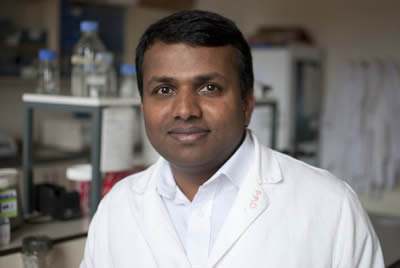The Natural Resources Institute, of the University of Greenwich UK announced today that it is a Grand Challenges Explorations winner, an initiative funded by the Bill & Melinda Gates Foundation. Dr Maruthi Gowda will pursue an innovative global health and development research project, titled "Use of endosymbiotic bacteria as a novel biocontrol agent for crop pests and diseases".
Grand Challenges Explorations (GCE) funds individuals worldwide to explore ideas that can break the mold in how we solve persistent global health and development challenges. Dr Gowda's project is one of over 100 Grand Challenges Explorations Round 8 grants announced today by the Bill & Melinda Gates Foundation.
"Grand Challenges Explorations encourages individuals worldwide to expand the pipeline of ideas where creative, unorthodox thinking is most urgently needed," said Chris Wilson, director of Global Health Discovery and Translational Sciences at the Bill & Melinda Gates Foundation. "We're excited to provide additional funding for select grantees so that they can continue to advance their idea towards global impact."
To receive funding, Dr Gowda and other Grand Challenges Explorations Round 8 winners demonstrated in a two-page online application a bold idea in one of five critical global heath and development topic areas that included agriculture development, immunization and nutrition. Applications for the current open round, Grand Challenges Explorations Round 9, will be accepted through May 15, 2012.
The main of aim of this project is to investigate if a certain type of bacteria named Wolbachia can be the basis of a strategy employed to control agriculturally important pests such as whiteflies and whitefly transmitted plant virus diseases. For this purpose, we use cassava brown streak disease (CBSD) as a model system, a disease that severely affects cassava production in Africa.
We will initially carry out research on the diversity of Wolbachia prevailing in African cassava whiteflies. This information will be used to further investigate the effect of Wolbachia infections on insect biology and virus suppression. These studies will then lead to the identification of Wolbachia strains that have desirable characteristics such as rapid population invasion and maximum virus inhibition, which can be used as an effective biological control agent for whiteflies and viral diseases such as CBSD.
 The Principal Investigator, Dr Maruthi Gowda is a Senior Research Fellow at the Natural Resources Institute of the University of Greenwich working predominantly on crop pests and diseases of tropics. He has over 10 years of research experience with wide ranging multidisciplinary skills from field epidemiology, molecular biology and tissue culture to functional genomics with particular strengths in plant-insect-virus interactions especially those involving geminiviruses, ipomoviruses and their whitefly vector, Bemisia tabaci.
The Principal Investigator, Dr Maruthi Gowda is a Senior Research Fellow at the Natural Resources Institute of the University of Greenwich working predominantly on crop pests and diseases of tropics. He has over 10 years of research experience with wide ranging multidisciplinary skills from field epidemiology, molecular biology and tissue culture to functional genomics with particular strengths in plant-insect-virus interactions especially those involving geminiviruses, ipomoviruses and their whitefly vector, Bemisia tabaci.
Dr Gowda joined NRI as a post-doctoral fellow in 2001, and now as a senior researcher he is leading a team of researchers using innovative technologies to find solutions to crop pests and diseases of subsistence as well as commercial crops such as cassava and tomatoes. In the last few years his research has focused on cassava brown streak viruses, which are transmitted by the whitefly to cause CBSD. His current research on Wolbachia as a biocontrol agent is a new addition to his efforts to mitigate the effects of plant viral diseases on the livelihoods of the poor.
About Grand Challenges Explorations
Grand Challenges Explorations is a US$100 million initiative funded by the Bill & Melinda Gates Foundation. Launched in 2008, over 600 people in 45 countries have received Grand Challenges Explorations grants. The grant program is open to anyone from any discipline and from any organization. The initiative uses an agile, accelerated grant-making process with short two-page online applications and no preliminary data required.Initial grants of US$100,000 are awarded two times a year. Successful projects have the opportunity to receive a follow-on grant of up to US$1 million.

